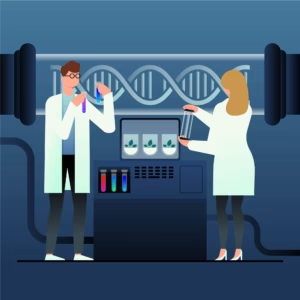Imagine a device that can provide a detailed blueprint of your entire genetic makeup. It provides unprecedented insights into your health. Whole genome sequencing (WGS) is a really powerful tool. The WGS analyzes the complete DNA sequence of a person. It provides a comprehensive view of their genetic information. This opens the door to more accurate disease prevention and diagnosis.
Whole genome sequencing is not just another technological advancement. It is reshaping the medical field. This approach allows scientists and doctors to examine the entire genome. They can see beyond just selected genes. This method makes it possible to identify genetic variations that can contribute to different health conditions. With this knowledge, healthcare professionals can tailor prevention strategies. They can also diagnose more effectively.
How WGS Works
Whole genome sequencing involves decoding all 3 billion base pairs of a person’s DNA. This method reveals both normal and rare genetic variants. Unlike traditional genetic tests that focus on specific genes, the WGS offers a comprehensive approach, highlighting potential genetic risks that may not be apparent in other ways. This in-depth analysis assists in identifying potential health issues, allowing for earlier intervention before they appear.
Identifying Genetic Risks and Predispositions
One of the major advantages of whole genome sequencing is its ability to identify genetic variants that can increase a person’s susceptibility to certain diseases. Equipped with this knowledge, healthcare providers can develop tailored prevention and early intervention strategies, empowering patients to take proactive steps to safeguard their wellbeing.

The Impact on Disease Prevention
Prevention is always better than cure. Whole genome sequencing plays an important role in identifying the genetic predisposition for diseases such as cancer, heart conditions, and rare genetic disorders. For example, if a patient has a family history of breast cancer, the WGS can identify specific genetic mutations associated with higher risk. This information enables healthcare providers to implement preventive measures, such as monitoring or lifestyle changes, significantly reducing the likelihood of disease onset.
Advancing Diagnosis with Precision
In terms of diagnosis, whole genome sequencing provides unparalleled accuracy. Traditional diagnostic methods may miss subtle genetic variations that may be significant for an accurate diagnosis. WGS, however, provides a complete picture, helping to diagnose complex genetic disorders that might otherwise go undetected. For example, patients with rare genetic disorders that present with a combination of symptoms may benefit from WGS by pinpointing the exact genetic cause, leading to a more accurate diagnosis and effective treatment plan.
The Potential for Early Intervention
Early detection is crucial when it comes to managing and preventing genetic based diseases. Whole genome sequencing equips healthcare providers with the tools to identify genetic markers and risk factors before symptoms even appear, allowing them to implement preventive measures and initiate timely interventions.
Benefits Beyond Disease Management
Whole genome sequencing also holds promise beyond immediate health benefits. It contributes to our understanding of human genetics, aid in research, and the development of new treatments. By providing detailed genetic information, WGS accelerates discoveries in genetics and personalized medicine, leading to more targeted and effective treatments.
As the field of genomics continues to evolve, the integration of whole genome sequencing into mainstream healthcare is paving the way for a new era of personalized medicine. By tailoring treatment and preventive strategies to a person’s unique genetic profile, healthcare providers can optimize outcomes and reduce the risk of adverse reactions.
Empowering individuals and healthcare providers
The rise of whole genome sequencing has not only changed the medical landscape, but has also empowered individuals to take a more active role in their health. By understanding their genetic predispositions, people can make informed decisions about their lifestyle choices, preventive measures, and proactive steps to protect their wellbeing.
Conclusion
In this constantly changing world of healthcare, whole genome stands as a beacon of hope, offering earlier disease detection, personalized treatments, and the promise of a future where preventive measures are the norm rather than the exception. As we continue to unlock the mysteries of the human genome, the potential for whole-genome sequencing to revolutionize disease prevention and diagnosis is endless.




